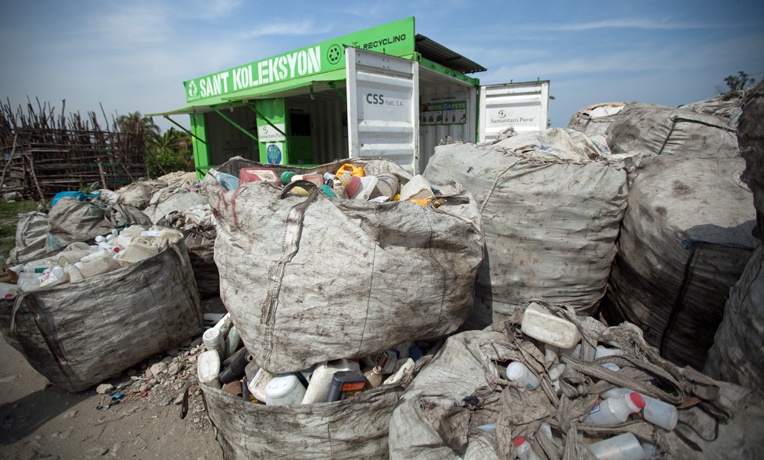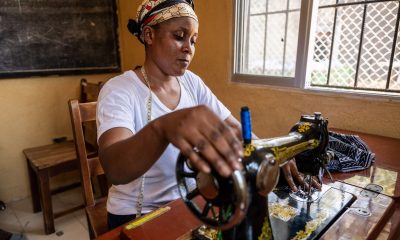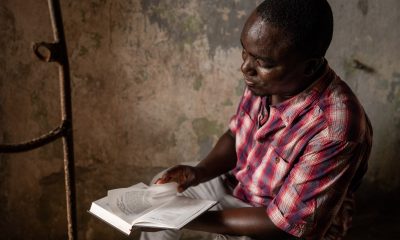The Ramase Lajan program started with six recycling centers in the poverty-stricken area of Cite Soleil and has expanded into 17 centers in 13 communities. This year the program reached a milestone of collecting over 4 million pounds of recyclables. For struggling Haitians, the bright green centers offer a source of income, improved health, and something beyond measure—enduring hope in Christ.
The giant sack of plastic bottles almost made it to the top of the pile before it came crashing down on the men reaching high to try and hoist it on the truck. They laughed and shouted in Creole and tried again.

Men lift recyclable materials onto a truck.
The canal is no postcard picture. But locals look at it and see progress. With animated gestures a few of them explained how it used to brim with rubbish clogging it and causing disease. The presently low water level makes this hard to imagine.
A big reason for the significant improvement is the recycling center on the other side of the truck, one of 17 scattered around the area. The center, a modified shipping container painted Kelly green, offers a welcome focal point against the tan dirt road and worn out structures. Bottles stripped of their labels and separated into blue, green, and clear pile up in bags out front, waiting to be tied and trucked off.
The men lifted the giant sack once more and found success.

Ramase Lajan gives center owner Mario Etienne a unique opportunity to share the Gospel with his neighbors. Four peddlers came to Christ last year through this center.
Peddlers—anyone of any age—bring recyclables to the centers and receive money in exchange. Center owners, usually selected by local churches and trained by Samaritan’s Purse, then sell the materials to Haiti Recycling at a slightly higher rate.
Accessibility is key. Young boys and girls turn in bottles on their way to school for lunch money. Parents bring in super sacks of recyclables in order to pay for their children’s school fees. Elderly men and women rely on the exchange to provide for their daily needs. So far, over $750,000 has been generated for participating communities.
Ramase Lajan changes the way people view trash.
“There are some communities where if you start drinking, there are people watching and waiting for the bottle,” program manager Adam Wilchide said with a laugh. “Now trash has value.”
The value is more than monetary. Because when the centers moved into the neighborhoods, the hope of the Gospel came too.

Adam Wilchide, the program manager, meets one-on-one with the recycling unit owners. This provides a chance to discuss ways of improvement and to celebrate victories, both small and large.
Martha formerly had a business selling rice, beans, and cereal, until she was robbed on the way to the bank one day.
“After that, I had nothing,” she said.
Martha didn’t know how she would recover. Then she was offered the opportunity to own a recycling center. She is now learning about business management, helping provide for her family again, and ministering to the community through her work.
Martha uses her earnings to buy formula for her 9-month-old. She uses her interactions with the peddlers to talk about Christ.
“It is very important because firstly, this is the word from God—to share the Gospel,” she said.

Locals see progress as more rubbish is removed from the canal.
The trainings are also utilized as ministry opportunities. Just as trash can be re-purposed and used for good, the teams speak about how God can recycle lives and bring His healing and light into brokenness and darkness. In one community, 48 people came to Christ after a screening of the JESUS Film in conjunction with a health and hygiene promotion training.

Health promoters, Chrislande Francois, 26, and Lamita Beauvais, 27, hold trainings at schools. They explain how long it takes for a plastic bottle to biodegrade and encourage students and faculty to utilize Martha’s center. They also share the Gospel, drawing a parallel to how God redeems people. “We let them know how to recycle their lives in Jesus.”
As Ramase Lajan continues, Adam, the program manager, asked for three specific prayers:
1. For God to unify the center owners
2. For everyone’s safety working in dangerous areas
3. For God to bless the staff
“I feel there is more success when we stay connected,” he said.
What is possible from here? Certainly more has happened already through Ramase Lajan than was originally planned.
As bottles pile up outside the green centers today in Haiti, the program serves as a catalyst to help people re-think what is worthless. Things that were easily disregarded now have value.
We never know what God can do with a plastic bottle, with a life, with faith. Maybe it’s a piece of Christ’s declaration to make things new. (Rev. 21:5)






